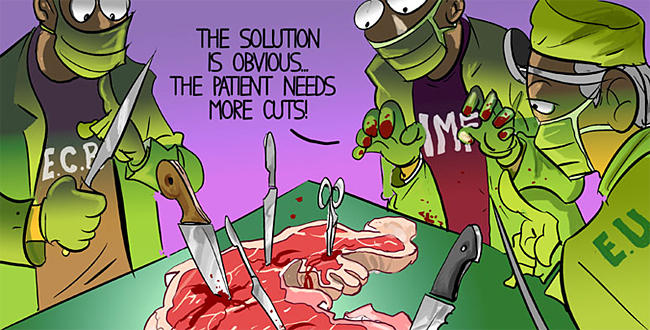JIANG Shixue:Greece's dilemma in fiscal cuts and EU membership
In the cartoon, the troika of the IMF, the EU and the European Central Bank, are depicted as ruthless butchers: knives in hand, slicing meat off of the debt countries. "The solution is obvious," they say. "The patient needs more (fiscal) cuts!"

Negative effects stemming from the fiscal cuts as demanded by the troika for Greece and other debt countries are obvious. Apart from sluggish growth from the belt tightening measures associated with fiscal cuts, there are also widespread social unrest in the forms of protests, unemployment and suicide, among others.
On May 6, the Greeks had a golden opportunity to express their anger against fiscal reduction. Voters weary of austerity measures and deep economic crisis punished the country's mainstream and pro-austerity parties at the polls; center-right New Democracy and center-left Pasok, the two parties that have ruled Greece for four decades, suffered an embarrassing setback in the parliamentary election whereas parties that rejected belt-tightening made big gains. The reason is straight forward: The two losing parties had agreed to accept the troika's austerity measures simply in exchange for two bailout packages totaling 220 billion euro.
Greece faces an obvious dilemma. Without external assistance, countries in debt crises would go bankrupt. But the bailout comes with tough conditions, that the beneficiaries must cut their spending. Undoubtedly, if Greece cannot meet its fiscal cutting target, the troika will not bail it out.
This kind of tradeoff is not new. In the 1980s, when Mexico and other Latin American countries fell into debt crisis, the IMF, along with the US, demanded cutting deficits in budget and trade, to be implemented before they would give aid. These measures led to an immediate nose-dive in economic growth.
The sad story took place again in 1997 when East Asia was caught in a financial crisis. The treatment was identical. Thailand, South Korea, Indonesia and some other Asian dragons were forced to adopt austerity so as to acquire external assistance. The effect was the same. Fiscal cuts let to severe economic recession in these nations.
The troika at present has good reasons to explain its belt tightening policies. Since Greece, Ireland and Portugal have huge fiscal deficits, how can they continue to spend as much money as they wish? As the saying goes: "No pain, no gain." That is why Spain and Italy would not agree to accept troika's help even though their economies are in great difficulties.
José Manuel Barroso, president of the European Commission, was reported to say, "The Greek people have been accepting extremely difficult sacrifices and I think now, if there is a real commitment to implement all the programs, these sacrifices will be remunerated, creating conditions for growth and jobs in Greece."
It is too simplistic to say that fiscal cuts are totally harmful for countries in crisis. Actually there are two kinds of austerity. One is to reduce public investment in productive activities, and this cut will jeopardize the economy. The other is to cut unnecessary, extravagant or wasteful government spending, and this measure is helpful for a fiscal balance. In other words, some of the fiscal cuts are necessary whereas others are detrimental.
The message from the troika is simple. If Greece cannot meet the agreed target of fiscal cuts, there would be no more bailout funds. Hopefully, the Greece politicians will think hard before they say "yes" or "no".
After the May 6 election in Greece, people around the world are asking whether the cradle of the Western civilization should also be its grave. The most unthinkable outcome would be an end of its membership in the euro zone.
There are two ways of ending Greece's membership in the euro zone: being forced out by EU leadership or leaving voluntarily. It seems that neither scenario is likely to happen. For the time being, there are no rules or treaties in the EU for the termination of a country's membership in the euro bloc. Moreover, such an action carries the danger of damaging the unity in the euro zone. As German leader Merkel says, in the face of a debt crisis today, it is imperative to have more Europe, not less.
Some people suggest that Greece should leave the Euro zone voluntarily so that it can regain sole control over its monetary policy to tide over the present crisis. Some economists even cite the example of Argentina which, in the face of a severe financial crisis in 2001 and 2002, dropped off the currency board, a rigid foreign exchange rate system, and walked out of the crisis quickly by devaluing the peso to stimulate exports.
For Greece, following Argentina's example might be a feasible option, as the Southern European nation does not have much to sell to the global market even if it could say "good-bye" to the EU.
Furthermore, after leaving the euro zone, Greece would definitely witness a financial catastrophe as capital would rush out of the country and banks would go bankrupt. No less significant is the cost of changing accounting system and price tags in business establishments across the whole nation.
The contagion effect of Greece's end in the euro membership would also be enormous. One of the biggest fears is that other nations in debt crises might follow Greece's footstep to print their own currency. If that should happen, the EU would be in great danger of breaking up. That is the scenario Germany and other nations in the euro zone would try very hard to avoid.
As the Chinese proverb goes, the roof leaks when it rains all night, or misfortunes never come single. Greece is faced with a twin-crisis because the winners in the Greek parliamentary election cannot agree on forming a coalition government. Now Greece sets for new elections as the coalition talks fell. Whatever the result, fear of disorderly default is on the rise, and that is certainly a heavy blow to market confidence.
http://www.china.org.cn/opinion/2012-05/16/content_25396298.htm
(Contact Jiang Shixue: jiangsx@cass.org.cn)
